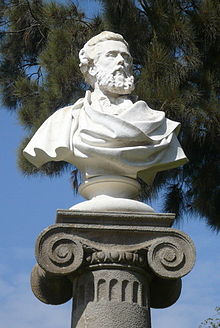You can help expand this article with text translated from the corresponding article in Catalan. (May 2015) Click for important translation instructions.
|
| The Most ExcellentVíctor Balaguer | |
|---|---|
 | |
| Born | Víctor Balaguer i Cirera (1824-12-11)11 December 1824 Barcelona, Spain |
| Died | 14 January 1901(1901-01-14) (aged 76) Madrid, Spain |
| Seat b of the Real Academia Española | |
| In office 25 February 1883 – 14 January 1901 | |
| Preceded by | José Selgas |
| Succeeded by | Ramón Menéndez Pidal |

Víctor Balaguer i Cirera (Catalan pronunciation: [ˈbiktuɾ βələˈɣe]; 11 December 1824 – 14 January 1901) was a Spanish politician and author, was born in Barcelona (Catalonia, Spain) on 11 December 1824, and was educated at the university of his native city.
Biography
His first dramatic essay, Pepín el jorobado, was placed on the Barcelona stage when he was fourteen years of age, and at nineteen he was publicly "crowned" after the production of his second play, Don Enrique el Dadivoso. From 1843 to 1868 he was the chief of the Liberal party in Barcelona, and as proprietor and editor of El Conseller did much to promote the growth of Catalan patriotism. But it was not till 1857 that he wrote his first poem in Catalan--a copy of verses to the Virgin of Montserrat. He was the author of Historia de Cataluña y de la Corona de Aragón in 5 volumes (Barcelona: Salvador Manero, 1860–63).
Henceforward he frequently adopted the pseudonym of "Lo Trovador de Montserrat"; in 1859 he helped to restore the "Jocs Florals", and in 1861 was proclaimed mestre en gay saber. He was removed to Madrid, took a prominent part in political life, and in 1867 emigrated to Provence.
On the expulsion of Queen Isabella II of Spain, he returned to Spain, represented Manresa in the Cortes, and in 1871—1872 was successively Overseas and Finance minister. He resigned office at the restoration, but finally followed his party in rallying to the dynasty; he was appointed vice-president of Congress, and was subsequently a senator. He died at Madrid on 14 January 1901.
See also
References
- "Víctor Balaguer - letra b". Real Academia Española (in Spanish). Retrieved 27 May 2023.
- Chisholm, Hugh, ed. (1911). "Balaguer, Victor" . Encyclopædia Britannica (11th ed.). Cambridge University Press.
| Real Academia Española seat b | |
|---|---|
|
- 1824 births
- 1901 deaths
- Politicians from Barcelona
- Liberal Party (Spain, 1880) politicians
- Members of the Congress of Deputies (Spain)
- Members of the Congress of Deputies of the Spanish Restoration
- Members of the Senate of Spain
- Spanish male writers
- Renaixença writers
- Members of the Royal Spanish Academy
- Overseas ministers of Spain
- Government ministers during the First Spanish Republic